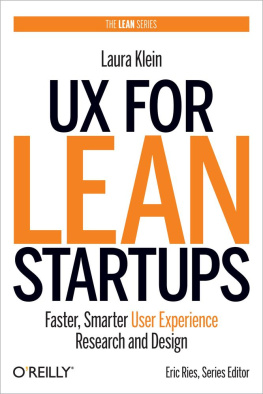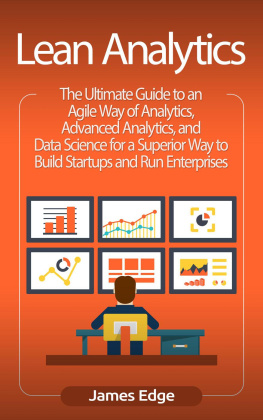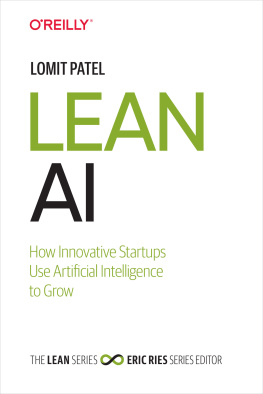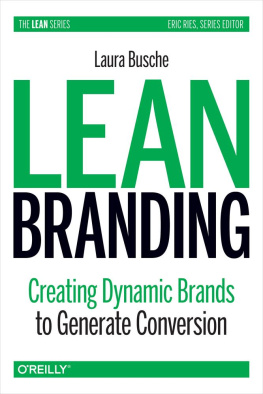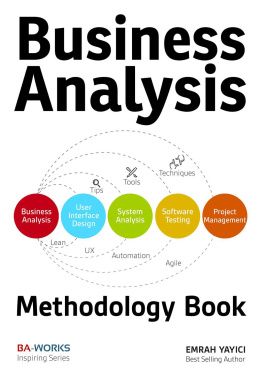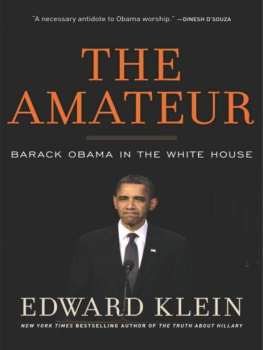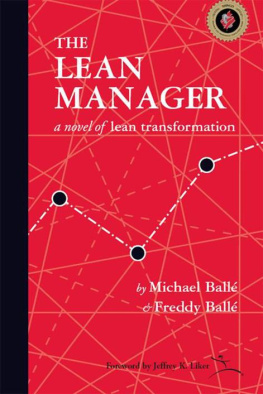Laura Klein - UX for Lean Startups
Here you can read online Laura Klein - UX for Lean Startups full text of the book (entire story) in english for free. Download pdf and epub, get meaning, cover and reviews about this ebook. year: 2013, publisher: OReilly Media, genre: Computer. Description of the work, (preface) as well as reviews are available. Best literature library LitArk.com created for fans of good reading and offers a wide selection of genres:
Romance novel
Science fiction
Adventure
Detective
Science
History
Home and family
Prose
Art
Politics
Computer
Non-fiction
Religion
Business
Children
Humor
Choose a favorite category and find really read worthwhile books. Enjoy immersion in the world of imagination, feel the emotions of the characters or learn something new for yourself, make an fascinating discovery.
- Book:UX for Lean Startups
- Author:
- Publisher:OReilly Media
- Genre:
- Year:2013
- Rating:5 / 5
- Favourites:Add to favourites
- Your mark:
- 100
- 1
- 2
- 3
- 4
- 5
UX for Lean Startups: summary, description and annotation
We offer to read an annotation, description, summary or preface (depends on what the author of the book "UX for Lean Startups" wrote himself). If you haven't found the necessary information about the book — write in the comments, we will try to find it.
Laura Klein: author's other books
Who wrote UX for Lean Startups? Find out the surname, the name of the author of the book and a list of all author's works by series.
UX for Lean Startups — read online for free the complete book (whole text) full work
Below is the text of the book, divided by pages. System saving the place of the last page read, allows you to conveniently read the book "UX for Lean Startups" online for free, without having to search again every time where you left off. Put a bookmark, and you can go to the page where you finished reading at any time.
Font size:
Interval:
Bookmark:

Beijing Boston Farnham Sebastopol Tokyo
A must read to find Product Market fit.
Andy RachleffPresident and CEO, Wealthfront; Cofounder, Benchmark Capital
Laura is an expert at teaching entrepreneurs how to understand their users and design innovative products. This book should be required reading for anybody with a startup.
Brett DurrettCEO, IMVU
Building great products starts with deep customer understanding, which is surprisingly hard to attain. In this book, Laura walks you through the nuts and bolts of learning from customers and shows you how to turn this learning into an amazing product.
Ash MauryaFounder, USERcycle
Making products that people buy, use, and love is a whole lot easier if you know Laura Kleins brilliant, no-nonsense Lean UX tools and tricks. She is an expert practitioner with a wealth of knowledge accumulated from years of working in Lean Startups and evolving the art of Lean UX. This book is an invaluable contribution to our field.
Joshua KerievskyCEO, Industrial Logic, Inc.
I expect you to put this book down a lot. Not because its bad; quite the contraryits funny, readable, and dare I say charming. Its just that there are so many good ideas and five-minute epiphanies within its covers, you wont be able to resist constantly firing off an email or picking up a pen and trying stuff out as you read it.
Alistair CrollFounder, Solve For Interesting
If you are an entrepreneur, especially if youre working in technology, you know the importance of user experience. But, unless youve worked closely with UX people, you probably dont know how to go about getting it right. Laura Kleins UX for Lean Startups is the book for you. This is a smart, practical book, filled with Lauras considerable wisdom, insight, and expertise. It demystifies UX concepts so you can put them to work immediately. Did I say its funny, too? It is. Get this book.
Josh SeidenManaging Director, NEO
This book offers specific, concrete answers to the question: How do we learn? Laura arms her readers with the design tools and research methods theyll need to lead teams through rapid hypothesis testingthe organizational practice that is at the core of Lean Startup.
Yee LeeVP of Engineering, TaskRabbit
An excellent guide for someone looking to leapfrog their knowledge of user-centered and data-driven UX design.
Rob WallingAuthor of Start Small, Stay Small: A Developers Guide to Launching a Startup
UX for Lean Startups is a mandatory read for anyone who designs and builds products. Laura provides an easy to follow, easy to understand, actionable set of tools and techniques that will dramatically improve your ability to create products your customers love to use. Along the way, shell make you laugh out loud and get inspired to get to work immediately. Like right now. Go!
Anne RaimondiChief Revenue Officer, TaskRabbit
This book will make you a better designer. If youre already a designer, that probably sounds pretty good. But I believe this is true for just about anyone, from engineers to MBAs.
I have had the privilege of working with Laura Klein for many years. She is a fantastic designer and has worked on many outstanding products. (Dont tell her I said this, but shes also a pretty good programmer, too.) But her talents as an individual contributor are surpassed by her ability to impact whole teams. And I am pleased to report that this extremely rare skill has now been translated into book form.
Laura has a special talent for helping nondesigners access the arcane toolkit that is sometimes called interaction design, usability testing, user experience (UX) design, oras is my preferencemaking things that work. Whatever you call it, every modern company must realize that good design drives growth, customer satisfaction, and continuous innovation. This book will put those tools immediately in your hands, no matter what it says on your business card.
Startups require good design, but they cant always afford a full-time designer. In fact, many of the most famous startups had nobody on staff trained in traditional design. Unfortunately, the kind of rapid, cross-functional collaboration that startups require is often at odds with the traditional approaches most designers grew up with. So in order to take advantage of the strengths of the design discipline, we need new approaches that support speed, collaboration, and experimentation.
If youre reading this, chances are you work in a startup or hope to become an entrepreneur someday. But one of the most important things we in the Lean Startup movement have been evangelizing is that anyone who is trying to create something new under conditions of high uncertainty is an entrepreneurno matter what their job description. If you find yourself becoming an involuntary entrepreneurfor example, someone inside an established company who faces high uncertainty all of the suddenyou will find these tools especially useful.
If youre looking for a book of abstract theory, aesthetic jargon, or gentle clichs, look elsewhere. This is simply the most practical design book, ever. It pulls no punches and accepts no excuses. Complicated concepts like the Minimum Viable Product are made accessible: its a cupcake, not a half-baked bowl of ingredients (see ). And every chapter is loaded with step-by-step instructions for how to make each concept come to life.
But by far my favorite part of this book is that every tip, every concept, every tool, every approach is placed in its proper context. It is extremely rare to see any expertlet alone a designerexplicitly tell you when not to use their best practices. But in real life, there is no such thing as a best practice. Every practice is contextual. Used in the wrong situation, every tool can become extremely harmful. Every tool and recommendation in this book (except one, which I leave as an exercise to the reader to find) comes with an explanation of when to skip it; most are helpfully labeled with their own headings.
Laura and I worked together long before I wrote the book The Lean Startup: How Todays Entrepreneurs Use Continuous Innovation to Create Radically Successful Businesses . I still cringe when reading some of the highly entertaining stories Laura tells of failed products and bad decisions; many of those mistakes were made by me. Let my dumb mistakes be your gain: listen to Laura Klein and do what she says. Become a better designer. Build great products. Make your customers lives better.
Good luck.
Eric Ries
San Francisco, CA
April 15, 2013
This book is for entrepreneurs. Its also for product designers, owners, and managers who want to make products that people will buy, use, and love. Its especially for people who are creating products in startups or companies that are trying to innovate like startups.
Dont worry if youre not a designer. It doesnt matter if youve never made a wireframe or talked to a user. If you read this book, youre going to learn enough about user experience (UX) to let you design your own product. No prior background in user experience or any other type of design is necessary to understand the concepts in this book.
This book is for decision makers. This book wont teach you how to sell your idea to your manager or how to convince people that user research is helpful or that a good user experience is necessary. What it will do is give you specific tools and tips for learning, designing, and shipping something amazing.
Font size:
Interval:
Bookmark:
Similar books «UX for Lean Startups»
Look at similar books to UX for Lean Startups. We have selected literature similar in name and meaning in the hope of providing readers with more options to find new, interesting, not yet read works.
Discussion, reviews of the book UX for Lean Startups and just readers' own opinions. Leave your comments, write what you think about the work, its meaning or the main characters. Specify what exactly you liked and what you didn't like, and why you think so.

